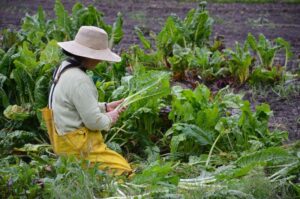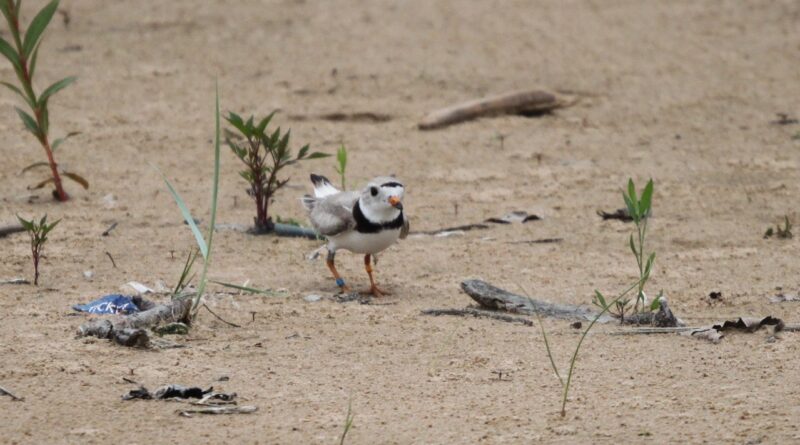Plover Summer on Lake Michigan
(August 9, 2020) If “Plover Summer on Lake Michigan” sounds like a beach movie, it actually is! In a way. We’ll get to that in the second hour of today’s show. But we start with another film that Peggy and I were supposed to have discussed on the show in the spring. It’s a documentary called Seasons of Change on Henry’s Farm. by filmmaker Ines Sommer and produced by Terra Brockman. It was going to be part of the 2020 One Earth Film Festival. And it was going to have one-week run at the Wilmette Theatre in May.
And then something called COVID-19 happened.
Along with schools, restaurants, churches and many businesses, movie theaters and festivals were shuttered. But the good thing about films is that they can be watched online. That’s the good news for Seasons of Change, which has already garnered a number of awards. And now, The Gene Siskel Film Center will host virtual screenings of the documentary beginning Friday, August 14. It’s called the “Film Center from Your Sofa” series and you can purchase tickets here. On Sunday, August 16 at 5pm you can talk to Ines Sommer, farmer Henry Brockman and other special guests.
But about the film.
 For a quarter-century, Henry and Hiroko Brockman have run Henry’s Farm, an idyllic family farm in Congerville, Illinois. Armed with intimate knowledge of soil, plants, and micro-climates, Henry produces an astounding 650 varieties of organic vegetables every year. But despite the farm’s success and support from many loyal customers, Henry dreams of scaling back. The physical demands of farming have taken a toll on his aging body and, like his fields, Henry needs a fallow year. So he puts his former apprentices in charge while taking a year’s sabbatical with Hiroko in her native Japan for some well-deserved relaxation and renewal.
For a quarter-century, Henry and Hiroko Brockman have run Henry’s Farm, an idyllic family farm in Congerville, Illinois. Armed with intimate knowledge of soil, plants, and micro-climates, Henry produces an astounding 650 varieties of organic vegetables every year. But despite the farm’s success and support from many loyal customers, Henry dreams of scaling back. The physical demands of farming have taken a toll on his aging body and, like his fields, Henry needs a fallow year. So he puts his former apprentices in charge while taking a year’s sabbatical with Hiroko in her native Japan for some well-deserved relaxation and renewal.
But things do not turn out as planned. While former intern Kris Pirmann leads the farm crew in Henry’s absence, turbulent weather strikes and devastates some of the crops. Daughter Aozora, a recent college graduate and poet, returns to work long hours on the farm, while longing to write. Meanwhile, Henry’s sabbatical frees his mind enough to let climate change enter his consciousness, unbidden and unwelcome, and he realizes he will have to re-envision the future of farming — for himself and for coming generations.
If you’ve ever shopped at the Evanston Farmers Market, you’re probably familiar with Henry Brockman and his farm. He has been selling vegetables in that Chicago suburb for more than 25 years.
The film is absorbing and thought-provoking. You’ll learn a lot about the challenges of farming organically and, basically, by hand. But the main message–about how climate change is increasing pressure on our ability to grow food–is beautifully woven into the story of a Midwestern family that cares about our planet and about passing along their farming legacy.
Director Ines Sommer and Producer Terra Brockman join us today. Terra, by the way, wrote the James Beard Award-nominated book, The Seasons on Henry’s Farm: A Year of Food and Life on a Sustainable Farm. She also founded The Land Connection, which “trains farmers in resilient, restorative farming techniques; informs the public about the sources of our food and why that matters; and works to protect and enhance farmland so that we, and generations to come, will have clean air and water, fertile soil, and healthy, delicious food.”
Welcome to Fruition Seeds
Don’t worry, we’ll get to “plover summer” soon. Meanwhile, earlier this week, Peggy showed me a newsletter from a company with which I was not familiar–Fruition Seeds. They bill themselves as “Organic Seed for the Northeast” and write about their mission. “We make organic gardening in short seasons easier and more abundant, sharing seeds we grow and everything we know.” Petra Page-Mann and Matthew Goldfarb founded Fruition in 2012 on 24 organic acres in Naples, the heart of the New York Finger Lakes. So they know about growing in zones 4-6.
But to get back to the newsletter, it was chock full of mid-summer gardening advice. Here’s just some of what is in their mailer.
Plant NOW!
DIRECT SOW: (resist transplanting root vegetables, as well as cilantro and dill)
– Dwarf peas!
– Roots: beet, carrot, watermelon radish, rutabaga, radish, turnip, kohlrabi
– Salad greens: all greens (it’s too hot for classic spinach so sow Asian spinach) & focus on heat loving lettuces
– Herbs: cilantro, dill, basil (last call for full-sized basil!)
SOW INDOORS & TRANSPLANT OUT:
– Sow fall broccoli, broccolini, cauliflower and cabbage as well as next succession of basil and greens indoors; harden off & transplant seedlings with 2 sets of true leaves
RESIST!
– Sigh! It’s a little too late for bush snap beans, cukes, zucs here in Zone 5; warmer seasons [I think they mean Zones], don’t dally!
– Wait to sow spinach, mache, claytonia and chervil until late August, since they thrive in cool seasons.
And that’s just scratching the surface of the advice they have to offer in that one newsletter. They even have a 7-page e-book, Fruition’s Guide to Sowing Autumn Abundance in August: Seeds, Strategies & Simplicity. Of course, the idea is to get you to buy their seeds. And if they’re going to give away all of that great free info, hey, why wouldn’t you give their seeds a chance?
Petra Page-Mann, co-founder of Fruition Seeds, joins us today. Get your notepads out. Even better, after listening to the show live, go back and listen to the podcast.
Plover Summer with Monty, Rose, Hazel, Nish and Esperanza
And now it’s time for “plover summer.” There’s not been a lot of good to say about the coronavirus pandemic of 2020…which will likely stretch into 2021 and possibly beyond. However, that statement applies to humans, not necessarily the other animal species with which we share the planet. Here in Chicago, local fauna got a reprieve from humans–especially if they live along Lake Michigan or use it as a flyway.
In May, this remarkable story appeared in the Chicago Tribune:
At 4:30 a.m. on a Wednesday, with the sky softening and chirps rising, you sense eyes on you. Because they are. The residents have had nine Chicagoan-free weeks to themselves, and now here you come, reminding wildlife of the cruelest lesson — nothing lasts. The caws of gulls, normally caustic as a smoker’s croak, explode with obscenities. Brad Semel, endangered species recovery specialist for the Illinois Department of Natural Resources, and one of the few who has been to the lakefront lately, described Montrose Point as feeling “surreal.” Still, it’s more feeling than actuality. “Animals that are nocturnal and restricted to when people and cars are not around, who are used ducking under stuff to get out of the way, they extended their hours, so to speak. There seems to be more loafing, relaxing. It must feel as strange for them as it does for us.”
But the real stars of this story are a pair of piping plovers and their offspring. Monty & Rose made international headlines in 2019 by becoming the first of their kind to breed on the shore of Lake Michigan in Chicago in 64 years. They just happen to be an endangered species. Then, as a kind of exclamation point, they returned in 2020. But because humans had been temporarily banished from the lakefront due to the coronavirus, the plovers returned to a beach free of people and pets and volley ball and potential rock concerts and all of the other flotsam and jetsam that comes with human development.
That led to an ornithologist to remark, “It felt like they owned the place.” Well, they did. And, in their second year back at Montrose Beach, they hatched four chicks. Only three of them made it, but that in itself is remarkable, considering how few piping plovers exist along the Great Lakes. They were named Hazel, after local environmental activist Hazel M. Johnson, Esperanza, for “hope,” and Nish, in honor of the area’s Potawatomi heritage.
As of the first week of August, it appears that all of the plovers had headed south. They are all tagged, so the wait is on to see if Monty & Rose, and perhaps even their offspring, will return to Chicago.
Today, we welcome Bob Dolgan back to the show. He was with us early this year to talk about his documentary, Monty & Rose, his delightful film that was part of the One Earth Film Festival. He’s now working on Monty & Rose II. You can watch the trailer here.
Also joining us is Douglas Stotz, senior conservation ecologist in the Keller Science Action Center at the Field Museum. He was last with us about eleven months ago. He is active in programs to preserve biological diversity and threatened habitats, both in the Chicago region and in other countries. In Chicago, he focuses his attention on studying bird migration, the effects of climate change on bird populations and the value of urban area to the conservation of biodiversity.


